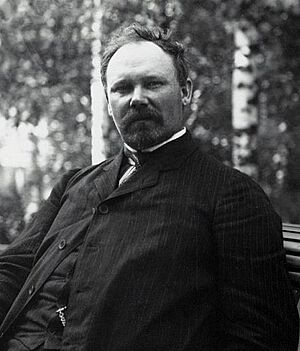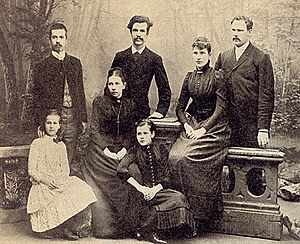Eemil Nestor Setälä facts for kids
Quick facts for kids
Eemil Nestor Setälä
|
|
|---|---|

Setälä, c. 1930
|
|
| Chairman of the Senate of Finland | |
| In office 8 September 1917 – 27 November 1917 |
|
| Preceded by | Oskari Tokoi |
| Succeeded by | Pehr Evind Svinhufvud |
| Personal details | |
| Born | 27 February 1864 Kokemäki, Finland |
| Died | 8 February 1935 (aged 70) Helsinki, Finland |
| Political party | National Coalition Party |
| Relatives | Kai Setälä |
Eemil Nestor Setälä (born February 27, 1864 – died February 8, 1935) was an important Finnish politician. He was briefly the Chairman of the Senate of Finland from September to November 1917. During this time, he helped write the Finnish Declaration of Independence, which made Finland its own country.
Setälä was also a well-known linguist, which means he studied languages. He was a professor of the Finnish language and literature at Helsinki University for many years. He greatly influenced how the Finnish language was studied. He also started a research institute called Suomen suku ("Finnish kin") and created a special alphabet for studying Uralic languages, called the Uralic Phonetic Alphabet.
Contents
The Life of Eemil Setälä
Eemil Setälä was born in 1864. He lived a life full of learning and public service.
Early Life and Family
In 1892, Eemil Setälä married a writer and editor named Helmi Krohn. She took his last name, Setälä. They later divorced in 1913, which was quite unusual in Finland at that time. Their daughter, Salme Setälä, grew up to become a famous architect and writer.
A Leader in Language Studies
Eemil Setälä spent much of his career studying and teaching about the Finnish language. From 1893 to 1929, he was a professor at the University of Helsinki. His work helped many people understand the Finnish language better. He also founded a research institute to study the connections between different Finnish languages.
His Political Journey
Setälä was very active in politics. He was elected to the Finnish parliament many times. He represented two different political groups: the Young Finnish Party and later the National Coalition Party.
Important Government Roles
Towards the end of World War I, Setälä served as the acting head of state for a short period. This was when he was the Chairman of the Senate. After this, he held other important jobs in the government. He was the minister of education in 1925, helping to guide Finland's schools. He also served as the Foreign Minister from 1925 to 1926, dealing with Finland's relationships with other countries.
Representing Finland Abroad
From 1927 to 1930, Setälä worked as an envoy for Finland. This meant he represented Finland in other countries, like Denmark and Hungary. His job was to build good relationships and discuss important matters between Finland and these nations.
Later Years and Legacy
After his time as an envoy, Setälä continued to contribute to education. From 1926 to 1935, he was the Chancellor of the University of Turku. This was a very important leadership role at the university.
Eemil Setälä passed away in 1935 and is buried in the Hietaniemi Cemetery in Helsinki. He is remembered for his significant contributions to both the Finnish language and the early government of independent Finland.
 | Aurelia Browder |
 | Nannie Helen Burroughs |
 | Michelle Alexander |


